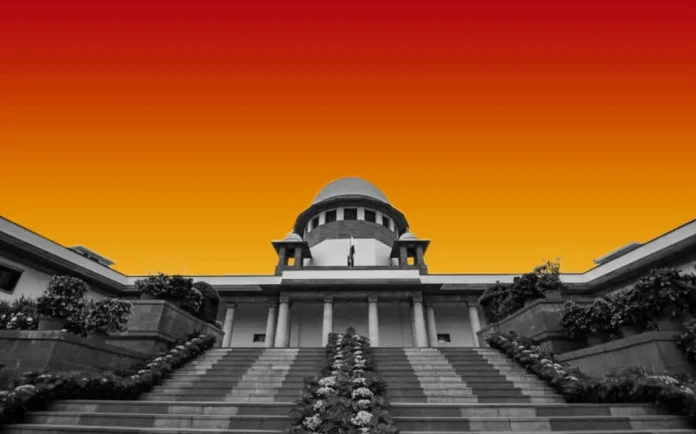Supreme Court judge Justice Abhay S Oka has said that it was time for the judiciary to acknowledge its flaws & deficiencies, and work on them to ensure timely delivery of justice
Speaking during an event organised by the Supreme Court Advocates-on-Record Association (SCAORA) at Bharat Mandapam in celebration of 75 years of the Constitution on Wednesday, he said the judiciary and the legal institutions had no right to pat their backs and say that the common man had faith in judiciary.
He said the statement was not substantially correct, in view of the fact that 4.54 crore cases were pending before various courts, out of which 25-30 percent were around 10-year-old.
Delivering a lecture on “Access To Justice And 75 Years of Constitution – Bridging the Gap between Judiciary and Citizens,” Justice Oka gave a detailed analysis about long pendency of cases before trial courts in the country, the suffering of undertrial prisoners due to delay in disposal of cases, and the state of judicial infrastructure across the length and breadth of India.
He said in the past 75 years, one major fundamental mistake has been committed by the judiciary by describing the trial and district courts as subordinate or lower courts, thus leading to their neglect.
Speaking on the criticism of the judiciary on the print, electronic and social media, along with television, Justice Oka said that unless criticism was done only for the sake of it and amounted to contempt, the judiciary must take it in stride and reflect on whether it was going wrong somewhere.
Earlier, criticism of the judiciary used to take place within four walls or corridors of courts, but the electronic media has brought a major change, leading to the criticism being heard loud and clear, he added.
Regarding the long pendency of cases, the Apex Court judge highlighted the rising burden of matrimonial cases, noting that in case such cases were not resolved at the outset due to family pressure, they gave rise to 4-5 grassroot level litigations, which ultimately found their way to the Supreme Court in the form of appeals and transfer petitions.
The Supreme Court judge said that efforts were needed at every level, otherwise the system would bring down the judiciary one day.
Justice Oka listed the stagnant judge-to-population ratio as another factor leading to the huge pendency of cases.
He said till the time the judge to population ratio was not increased, the talks about pendency would continue even after completion of 100 years of the Constitution.
Noting that only the creation of posts would not solve the problem, he stressed on the need for more staff, hardware and software, along with more courts, to reduce pendency of cases.
Highlighting the suffering of undertrial prisoners and their family members, Justice Oka said the delayed disposal of cases, such as bail matters, added to pendency.
He also raised concerns about matters wherein after prolonged incarceration, an accused was ultimately acquitted for lack of evidence.
It was important to think of the consequences in such cases. The entire family of a criminal suffered.
He said in a lighter tone that some day, some litigant may question the judges that when there was no evidence against him, why was he detained for 10-12 years, or may be 3-4 years.
He may seek compensation not only for himself, but also for his family who suffered extensively, added the Apex Court judge.
He further spoke about the status of victims, complainants and witnesses in the justice delivery system.
While the victims or complainants were not effectively informed about investigations, the witnesses in criminal cases were summoned and sent back on multiple dates. They were neither provided real protection, nor given allowances, he added.
Often, there was no proper cross-examination of eye-witnesses by legal aid lawyers. The neglect of legal aid lawyers may lead to judges convicting persons against whom there was no real evidence, he noted.
Noting that one Public Prosecutor was currently attached to around 2-3 courts, he said it would be difficult to make any headway unless one PP was attached to just one court.
Justice Oka commented that when it came to judicial infrastructure, labour and industrial courts were the most neglectedones.
He also spoke about the adjournment culture, the abstention of lawyers from court work, along with bulky pleadings, counter-affidavits and judgments.
Terming the abstention from court work by lawyers as plainly criminal, Justice Oka said their abstention even before 3-4 different Benches of a High Court not only caused loss to the litigants, but also led to hundreds of bail matters getting adjourned for months, while trials remained pending for years.
The Apex Court judge called for members of both the Bar and the judiciary to ensure that precious court time was not wasted.
SCAORA President Vipin Nair, Honorary Secretary Nikhil Jain and office bearers of the organisation, among others, were present on the occasion.


